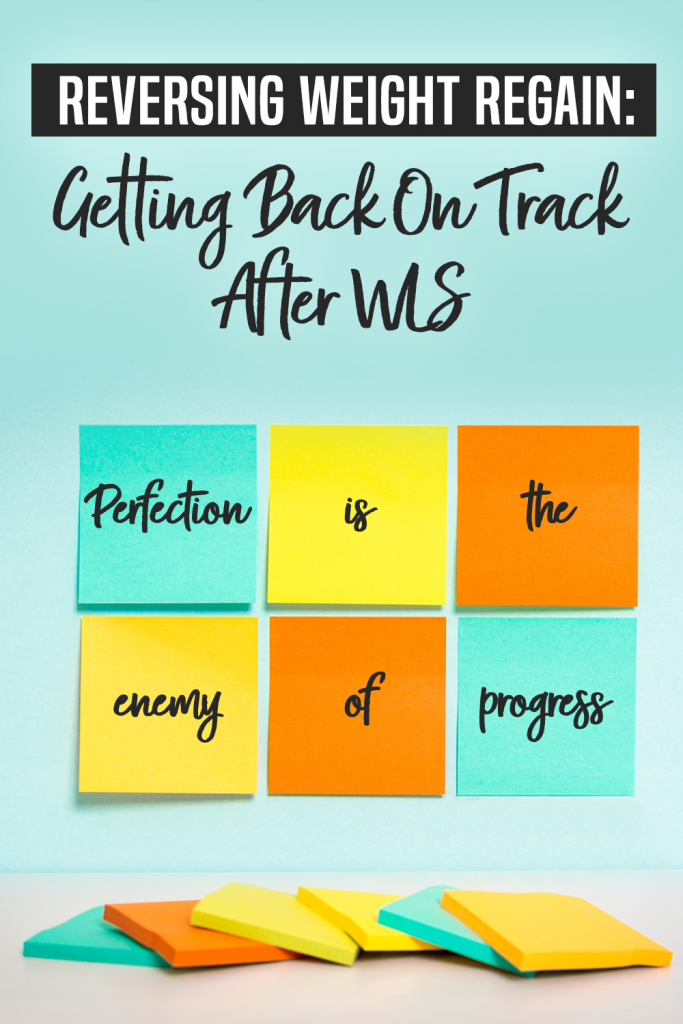
Reversing Weight Regain: Getting Back On Track After WLS
July 14, 2021Reversing Weight Regain: In my work supporting other bariatric patients, the fear of regain is a common theme. For many bariatric patients, the lifelong struggle with obesity is an uphill battle, and the work doesn’t stop after your surgery and initial weight loss. Obesity is a complex disease requiring a lifelong commitment to healthy habits and lifestyles.
Regain can happen, and a certain amount is expected. First of all, know you are not alone! The American Society for Metabolic and Bariatric Surgery (ASMBS) states that as many as 50 percent of patients regain a small amount of weight, approximately 5 percent, 2 years or more following their surgery.
Don't worry; when you get back to basics, it’s possible to restore your habits and get you back on track to reversing weight regain.
Advice: Be patient, be kind to yourself, and find your commitment to dig deep to lose weight regain. Remember that this is a journey; a marathon, not a sprint. You're working on YOUR timeline.
Reconnect with Your “Why”
What are your personal reasons for choosing healthier habits? What is your "why?" For some, it's about health, both physical and emotional. Some get their motivation from their family or from wanting to create a good example for their children. What led you to your health journey in the first place is unique to you. The clearer you are with understanding your "why," the easier it will be to stay connected to it.
When you connect with your "why," you can keep your motivation at the forefront as you make your daily decisions about nutrition, movement, or mindset.
Restore Your Healthy Habits
Restoring your habits is all about getting back to the basics of bariatric nutrition and lifestyle. Our goal here is to get back to your post-surgery hunger awareness, making sure you are getting adequate nutrients, fueling your body for success, and letting your surgical tool do its job!
Remember Your Food Rules
For all of my beloved rebels, don't let the word "rules" bother you. No need to rebel against this one. These are general guidelines that are at the core of bariatric life after surgery. Sure, none of us are perfect, but we shoot for progress over perfection over here!
Getting Back to Basics
Following the same rules you followed post-surgery is the best place to start:
1.
Weigh and measure your food
It's important to know how much food you are eating when you eat.
2.
Protein first
When your protein intake is low, you might feel depleted and may reach for food that is convenient or with a higher carb or calorie count than what you want during a weight loss phase. In choosing a protein source, it's helpful to choose something dense, solid protein, depending on your tolerance and eating preferences.
3.
Use bariatric formulated protein supplements
The ASMBS guidelines recommend getting 60-80 grams of protein daily. Using a high-quality whey isolate protein supplement will not only help you hit your protein goals, but you will feel fuller and more satisfied, and you will have higher absorption of protein.
4.
Eat slowly and mindfully
Did you know that it takes your brain 20 minutes to receive the signal from your gut that you are full? So when you eat slowly, you can be more mindful and aware of what you are eating and how full you are, which usually leads to eating less.
5.
Stop eating at the first sign of fullness
Do you sometimes feel like your pouch is a bottomless pit, but some days you can only eat a few bites before you are full? It's important to pay attention to these signals. What are your familiar signs of fullness? Some people get hiccups, some people feel it in their chest, and some people get a runny nose. Whatever your signal is, pay attention and be sure to stop once you get there. Slowing down and chewing well will help this awareness too.
6.
Do not drink for 30 minutes before and 30 minutes after your meal
Drinking liquids while you eat will push food through your pouch faster, preventing you from feeling the restriction your surgery created for you. Go back to basics here. Whatever you did to keep track of this time right after surgery, do that. I use my Apple Watch or my phone's timer to make sure I am really mindful of the timing of my eating.
7.
Get adequate hydration
Shoot for a minimum of 64 ounces of water a day. Drinking water is the best way to stay hydrated. Still, if you are struggling to get this in, you can count decaffeinated or herbal teas and other zero-calorie drinks like Crystal Light or use other flavor enhancers like lemon, ginger, cucumber, basil, mint, or your favorite herbal infusion. So go ahead -- get fancy.
8.
Take your vitamins and mineral supplements
Definitely follow your program's instructions on this, but most people require a bariatric formulated multi-vitamin, calcium and vitamin D, vitamin B12, and perhaps iron, depending on their lab work. That's just one reason why it's essential to stay connected with your program and get at least annual lab work done to monitor your levels.
9.
Avoid food and beverages containing sugar
Be very aware of how much sugar you are consuming, both in natural sugars and added sugars. Try to keep your sugar limited to 5 grams or less per serving. Check labels while you are at the store before you buy something and bring it into your house.
10.
Avoid high fat foods
Everyone's reactions to high-fat foods is different, but just because something doesn't give you dumping syndrome, it doesn't mean you should eat it. Limit your fats to healthy fats from whole food ingredients, like avocado, nuts and nut butters, and olives/olive oil. You need to have fat in your diet, but because fat is also high in calories, keep this in check while you are trying to reverse regain.
11.
Avoid carbonated beverages, caffeine, and alcohol
There are many health reasons for avoiding these things after surgery, but most importantly, protecting your pouch and digestive system and avoiding bloat, dehydration, and inflammation in your body. Clear these things from your diet, and you will feel more energized in time.
These rules applied right after surgery, and my guess is you did well when following them. For long-term weight management, following these rules now and for eternity should be your goal in reversing weight regain. But also remember: we are human. Progress over perfection. If you slip up, just get right back to it. Aim to be one percent better every single day.
Stay Rooted in Positivity and Gratitude
One of the most transformative healthy habits is the habit of gratitude.
Being grateful for who you are, where you are, and how far you have come, is a great place to start. Living a life rooted in gratitude is a powerful way to boost your happiness and positivity. Those negative thoughts really are affecting your brain, your emotions, and your overall outlook on life.
Focusing on where you are now acknowledges your accomplishments. Rather than focusing on what you don't have right now, or what you haven't achieved, be here now - focus on the present and have a positive outlook for the future.
A simple tool I adopted a few years back was a gratitude practice. I write down 3 things I am thankful for every morning, no matter what. I use my planner for this purpose, but find yourself a beautiful journal or notebook, and make it your gratitude journal. And remember to use pen and paper -- the act of writing down thoughts gets them out of your head, clears your mind, and helps you to process your thoughts.
Remember: Progress Over Perfection Works For Reversing Weight Regain! You’ve got this!

 | ABOUT THE AUTHOR Marilyn Clark is a certified Nutrition & Lifestyle Coach, a certified personal trainer, radical self-care advocate, an obesity survivor, a bariatric patient, and runs her website Off The Plate. She is a certified Integrative Nutrition Health Coach, a Level 1 Precision pro certified in Sports & Exercise Nutrition, & a personal trainer by the National Academy of Sports Medicine Certified Personal Trainer program! Read more articles by Marilyn! |



